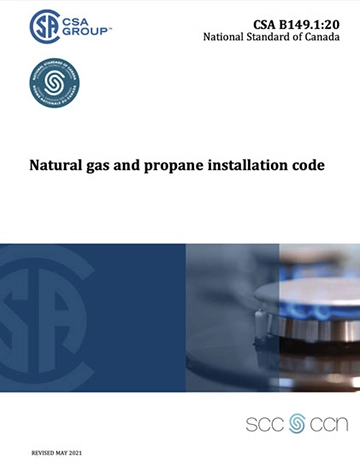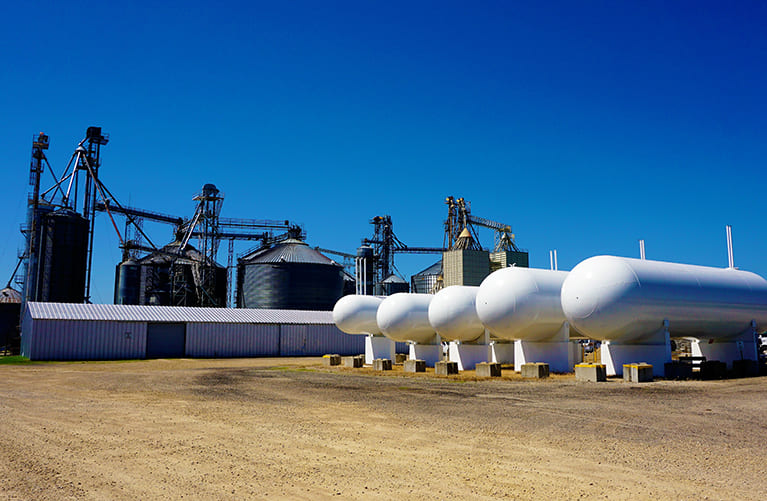Preface
This is the sixteenth edition of CSA B149.1, Natural gas and propane installation code. It supersedes the previous editions, published in 2015, 2010, 2005, and 2000 by CSA Group (CSA) as CAN/CSA-B149.1, in 1995, 1991, 1986, 1980, 1978, 1976, and 1974 by the Canadian Gas Association (CGA), and in 1971, 1966, 1962, and 1958 by CSA Group.
The major changes from the previous edition include the following:
• Updated Scope exclusions (Clause 1.2).
• Updated reference publications (Clause 2).
• Updated definitions (Clause 3).
• Updated requirements for electrical connections and components (Clauses 4.7.3 and 4.7.4).
• Updated requirements for high-altitude installations (Clause 4.22).
• Updated requirements for delivery pressure (Clause 5.1).
• Updated requirements for pressure regulators (Clause 5.2).
• Updated requirements for overpressure protection devices (Clause 5.3).
• Updated requirements for venting of pressure control devices and added requirements for venting exemptions for line pressure regulators (Clauses 5.5.2, 5.5.3, and 5.5.4).
• Added new Clause 5.6 for termination of vents.
• Updated requirements for material (Clauses 6.2.2, 6.2.3, and 6.2.5).
• Updated requirements for size (Clauses 6.3.2 and 6.3.3).
• Updated requirements for piping practices (Clause 6.8.10).
• Updated requirements for joints and connections (Clauses 6.9.1 and 6.9.4).
• Updated requirements for manual shut-off valves (Clause 6.18.1).
• Updated requirements for gas connectors (Clauses 6.21.8 and 6.21.9).
• Updated requirements for purging of gas piping systems after leak testing (Clause 6.23).
• Updated requirements for compressors/pressure boosters (Clause 7.2.2).
• Updated requirements for emergency generators (Clause 7.2.3).
• Updated requirements for non-motive engines and turbines (Clause 7.2.4).
• Updated requirements for additional requirements for gas engines and turbines in buildings (Clauses 7.2.5.1 and 7.2.5.3).
• Updated requirements for direct gas-fired process air heaters (DFPAH) (Clauses 7.22.6, 7.22.7, 7.22.8, 7.22.9, 7.22.11, 7.22.12, 7.22.13, 7.22.16, 7.22.17, and 7.22.18).
• Updated requirements for lighting (Clause 7.31.4).
• Added requirements for operation of appliances at shows, exhibitions, or other similar events (Clause 7.35).
• Updated requirements for air-supply requirements for appliances having a total input exceeding 400 000 Btu/h (120 kW) (Clauses 8.4.2, 8.4.3, and 8.4.4).
• Updated requirements for air-supply dampers, louvres, and grilles (Clauses 8.5.4 and 8.5.6).
• Updated requirements for cylinder storage (Clauses 9.4.3 and 9.4.4).
• Updated requirements for residential fuelling appliances (RFAs) and vehicle fueling appliances (VFAs) used for natural gas without storage (Clauses 10.1.1, 10.1.2, and 10.1.3).
• Added new Annex J for acceptance criteria for visual inspection of welds.
• Added new Annex K for pressure regulators and overpressure protection devices.
• Added new Annex L for recommended requirements for automatic safety shut-off valves and automatic vent valves installed on gas turbines having capacities greater than 12.5 MMBtu/h (3.66 MW) and inlet pressures greater than 150 PSI.
• Added new Annex M requirements for the operation of appliances at shows, exhibitions, or other similar events.
• Added new Annex N for generators, compressors/pressure boosters, engines, and turbines.
This Standard has been developed in compliance with Standards Council of Canada requirements for National Standards of Canada. It has been published as a National Standard of Canada by CSA Group.
Scope
1.1
This Code applies to the installation of
a) appliances, equipment, components, and accessories where gas is to be used for fuel purposes;
b) piping and tubing systems extending from the termination of the utility installation or from the distributor’s propane tank;
c) vehicle-refuelling appliances and associated equipment meeting the requirements of a general-purpose appliance to fill a natural-gas-fuelled vehicle; and
d) stationary gas engines and turbines.
1.2
This Code does not apply to
a) marine or pipeline terminals;
b) gas where used as a feedstock in petroleum refineries or chemical plants;
c) utility pipeline distribution and transmission pipelines;
d) storage and handling of liquefied natural gas or underground formations for natural gas;
e) the installation of NGV fuel systems, containers, and refueling stations;
f) the storage and utilization of compressed natural gas on boats;
g) the installation of vehicle-refuelling appliances when NGV storage containers are installed as part of the system;
h) refrigerated storage or underground formations for propane;
i) propane used on boats;
j) propane used as a propellant in aerosol containers;
k) butane fuel cylinders of 6.2 oz (175 g) capacity or less;
l) the installation of containers and equipment to be used for propane in distribution locations and filling plants and on tank trucks, tank trailers, and cargo liners; and
m) propane used as refrigerant.
1.3
Where the term gas is used, the requirements of this Code include, and apply equally to, any of the following gases or mixtures of them: natural gas, manufactured gas, or mixtures of propane gas and air, propane, propylene, butanes (normal butane or isobutane), and butylenes.
1.4
This Code and any Standards referenced in it do not make or imply any assurance or guarantee with respect to the life expectancy, durability, or operating performance of equipment and materials referenced in the Code.
1.5
The values given in yard/pound units are the standard. This Code contains SI (metric) equivalents to yard/pound units so that the Code can be used in SI (metric) units. SI (metric) equivalents may be approximate.
1.6
In this Code, shall is used to express a requirement, i.e., a provision that the user is obliged to satisfy in order to comply with the Code; should is used to express a recommendation or that which is advised but not required; and may is used to express an option or that which is permissible within the limits of the Code.
Notes accompanying clauses do not include requirements or alternative requirements; the purpose of a note accompanying a clause is to separate from the text explanatory or informative material.
Notes to tables and figures are considered part of the table or figure and may be written as requirements.
Annexes are designated normative (mandatory) or informative (non-mandatory) to define their application.



